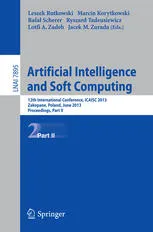Artificial Intelligence and Soft Computing: 12th International Conference, ICAISC 2013, Zakopane, Poland, June 9-13, 2013, Proceedings, Part II
3.8
Reviews from our users

You Can Ask your questions from this book's AI after Login
Each download or ask from book AI costs 2 points. To earn more free points, please visit the Points Guide Page and complete some valuable actions.Introduction to "Artificial Intelligence and Soft Computing: 12th International Conference, ICAISC 2013, Zakopane, Poland, June 9-13, 2013, Proceedings, Part II"
Welcome to the fascinating world of "Artificial Intelligence and Soft Computing," a remarkable compilation of research findings, methodologies, and real-world applications presented at the esteemed 12th International Conference on Artificial Intelligence and Soft Computing (ICAISC 2013) in Zakopane, Poland. Held over five days between June 9–13, this conference brought together top minds from academia, industry, and government to explore advancements in artificial intelligence (AI), machine learning, and soft computing techniques. This book represents Part II of the proceedings, ensuring that readers gain profound insights into specialized topics hosted during this thought-provoking event.
Detailed Summary of the Book
As one of two volumes documenting the contributions made at ICAISC 2013, this publication dives deep into cutting-edge advancements in AI and its subfields. The book comprises peer-reviewed papers authored by researchers and experts from around the globe, ensuring the highest caliber of scientific rigor. It spans a diverse range of topics, including but not limited to:
- Deep learning and neural networks
- Fuzzy systems and their applications
- Evolutionary computing and genetic algorithms
- Real-world implementable AI models
- Hybrid approaches combining traditional methods with soft computing
Each chapter represents a unique contribution to AI and soft computing, addressing specific research challenges, presenting innovative methodologies, and reporting groundbreaking results. The volume serves both as a comprehensive academic reference and as an inspirational guide for professionals tasked with practical implementations in areas such as healthcare, finance, robotics, and engineering.
Key Takeaways
- Emphasis on soft computing as a complement to traditional AI techniques, providing flexibility and robustness in solving complex problems.
- Novel applications of fuzzy logic, neural networks, and genetic algorithms to real-world challenges, demonstrating versatility across industries.
- State-of-the-art research validating the integration of multiple computing paradigms for achieving superior performance levels in AI systems.
- Practical insights into bridging the gap between theoretical models and scalable automated solutions.
- A strong collaborative focus, highlighting the importance of multidisciplinary approaches within AI-related studies.
Famous Quotes from the Book
"Soft computing enhances our ability to model uncertainty and imperfection, paving the way for more adaptive and intuitive AI systems." – Conference Speaker
"The marriage of evolutionary computing and neural networks is not just a theoretical construct—it’s the future of scalable intelligent systems." – Renowned Author
"ICAISC 2013 is a testament to the growing consensus that breakthroughs in AI emerge at the intersection of creativity and collaboration." – Editor
Why This Book Matters
"Artificial Intelligence and Soft Computing: Proceedings Part II" stands as an essential resource for anyone looking to expand their understanding of soft computing methods and their practical applications. Soft computing, unlike traditional computational intelligence, embraces the concept of approximation for handling real-world complexity. By focusing on methodologies such as fuzzy logic, genetic algorithms, and neural networks, this book demonstrates the promise of more agile, adaptive, and human-centric systems in artificial intelligence—a critical upgrade from classical systems that often failed to deal with incomplete and imprecise information effectively.
Whether you are a researcher, practitioner, or student, the wealth of information presented in this book positions it as a foundational text for exploring the frontiers of AI. It highlights the transformative role that novel computational approaches can play in solving previously unsolvable problems while emphasizing the importance of an interdisciplinary approach to innovation. At a time when AI continues to reshape society, industries, and our everyday lives, the lessons contained within this volume are more relevant than ever.
Free Direct Download
You Can Download this book after Login
Accessing books through legal platforms and public libraries not only supports the rights of authors and publishers but also contributes to the sustainability of reading culture. Before downloading, please take a moment to consider these options.
Find this book on other platforms:
WorldCat helps you find books in libraries worldwide.
See ratings, reviews, and discussions on Goodreads.
Find and buy rare or used books on AbeBooks.
1068
بازدید3.8
امتیاز50
نظر98%
رضایتReviews:
3.8
Based on 0 users review
"کیفیت چاپ عالی بود، خیلی راضیام"


